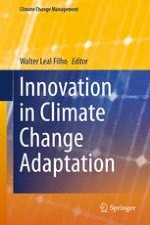2016 | OriginalPaper | Buchkapitel
21. Grassroots Technologies and Community Trust in Climate Change Adaptation: Learning from Coastal Settlements of Bangladesh
verfasst von : Momtaj Bintay Khalil, Brent C. Jacobs, Natasha Kuruppu
Erschienen in: Innovation in Climate Change Adaptation
Aktivieren Sie unsere intelligente Suche, um passende Fachinhalte oder Patente zu finden.
Wählen Sie Textabschnitte aus um mit Künstlicher Intelligenz passenden Patente zu finden. powered by
Markieren Sie Textabschnitte, um KI-gestützt weitere passende Inhalte zu finden. powered by
